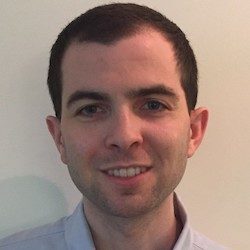When Brian Price decided to pursue a career in software engineering after working in film and TV development and production, he knew he’d have to start from scratch.
“I knew basically nothing,” he said. “I’d heard the terms HTML and JavaScript related to web page design, but that’s about as far as my knowledge went.”
While exploring educational options, he was drawn to our Basic Prep course, which helps learners prepare for our Intermediate Coding Bootcamp.
After the bootcamp, he landed a job as a Software Engineer at Topsheet, a full-stack solution for entertainment payroll and production services, where he’s now worked for more than a year.
“The amount of knowledge I learned during the bootcamp was astronomical,” said Brian. “Compared to a college course where you’re spending several hours a week in class, this immersive experience felt equivalent to a few years worth of that.”
Why the switch to software engineering?
Brian grew up loving brain teasers, math, and logic – things often associated with interest in technical fields. But he was also drawn to the liberal arts and followed that path toward a Master of Fine Arts degree in Screenwriting. He worked in the entertainment industry as a writer, then on the development side, for 6+ years before running into a problem that took him by surprise: he didn’t feel creatively fulfilled, and it was very important to him to feel that in his work and career.
Looking for answers, he took some career aptitude tests at The Johnson O’Connor Research Foundation, which suggested software engineering might be a good fit for him. Upon further exploration, he realized the breadth of creativity alive within the field. At Topsheet, he’s able to tap into that regularly.
“I’ve always been a creative person and enjoyed building things,” he said. “At Topsheet, I enjoy the logic processes and mapping out where in the app certain events need to happen and thinking, what would a user want to do? And then it’s for me to figure out, what are the ways I can make it possible while also planning for any potential problems that could arise while they’re using this.”
As one of two engineers on the team, Brian works on a variety of tasks ranging from creating features from the ground up to fixing bugs, and he routinely enjoys the satisfaction of seeing users interact with his work in real time. He’s run into plenty of challenges on the job, too, but considers his time in the bootcamp good preparation for tackling whatever problems arise.
“The bootcamp prepares you for the real world, where you’re not going to have people holding your hand every step of the way. It’s inevitable that you’re going to run into new concepts and new technologies as you progress,” he said. “Having the training from Hack Reactor has helped me feel more confident, especially when I get assigned something that I know nothing about. I know I can figure out how to tackle it because I’ve faced situations like this before.”
Fulfillment born out of commitment
Making a career change wasn’t something Brian took lightly. Before he decided to go our Basic Prep and bootcamp route, he researched various learning options and programs and talked to graduates and others working in the field to better understand what he was getting himself into. Through all of it, the concept of commitment kept rising to the surface.
“I learned that you definitely want to be aware that you need to fully invest yourself in this program,” he said. “It’s not something you can go half in on. I think you need to be fully committed and a hundred percent invested.”
And though he believes everyone’s journey to software engineering is different and unique, he also knows from experience that it’s possible to do what he’s done – to make a fast transition into software engineering from an unrelated career and in a short period of time.
“I was someone with no engineering experience whatsoever. I went from total amateur to working software engineer in under a year after committing to learning and making a career out of this,” he said. “I’m extremely satisfied with that achievement and owe a deep gratitude to everything I learned in the program.”
